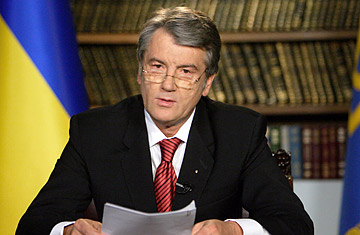
Ukrainian President Viktor Yushchenko speaks during a televised address to the nation from Kiev, Ukraine, on Wednesday, Oct. 8
"Keep an eye on Ukraine" has become something of a refrain for Senator John McCain, who warns darkly that the former Soviet republic may be the next victim of Moscow's efforts to squelch plucky little democracies on its doorstep. McCain urges that the U.S. respond by doing whatever it can to speed Ukraine's accession to membership in NATO. But Ukrainian democracy has a way of muddying the picture. On Wednesday, President Viktor Yushchenko, a strong U.S. ally and champion of NATO membership, called a snap parliamentary election, following the collapse of his ruling coalition last month. Questions of the country's future relationship with Russia and the West remain contested in Ukraine's political maneuvering, but it was not manipulation on the part of Moscow that brought down the Yushchenko government. The immediate threat comes from Yushchenko's erstwhile key coalition partner, the ambitious populist politician Yulia Tymoshenko. She had joined with him in the "Orange Revolution" that eclipsed Moscow's preferred candidate at the end of 2004, but she has since been engaged in a power struggle with him and has left no doubt as to her intention of ultimately seeking the presidency for herself.
Tymoshenko, whose party is far more popular than Yushchenko's, has been campaigning, perhaps with an eye on the 2010 presidential race, in eastern Ukraine — where much of the population inclines more toward Russia than toward the West — and has backed the more Moscow-friendly Party of the Regions headed by Viktor Yanukovych. In last year's parliamentary election, Yanukovych's party polled highest, winning just over one-third of the national vote, but was kept out of power by a renewed coalition between Tymoshenko and Yushchenko.
But the rivalry between the two has persisted, and the summer's hostilities between Russia and Georgia sharpened the differences between the President and his erstwhile partner over Ukraine's direction. Yushchenko rushed to side with Georgian leader Mikheil Saakashvili and urged NATO members to expedite Ukraine's NATO membership; Tymoshenko was sharply critical of his response, arguing instead for neutrality and promising voters that she would keep Ukraine out of conflicts between other countries. While committed in principle to NATO membership at some point in the future, she is in no hurry to force the matter or take any steps that might provoke Russia. In aligning with the West, she places a higher priority on getting Ukraine into the European Union, with the attendant economic benefits, than on the security benefits attached to NATO membership.
Tymoshenko's posture toward Moscow has lately been quite different from Yushchenko's, calling for "balance" in relations with Ukraine's more powerful neighbor and criticizing the President for antagonizing the Russians with his stance on issues such as the Russian naval base in the Crimean port of Sevastopol. Observers in Ukraine believe her priority in dealing with Moscow right now is to secure lower prices for the natural-gas imports on which the country depends, and given Russia's inclination to use energy for geopolitical leverage, that requires a more cooperative relationship. While avoiding being seen as choosing sides between Washington and Moscow, Tymoshenko has nonetheless sought to strengthen her relations with the U.S. Like many leaders along Russia's periphery, in the wake of the Georgia crisis, she inclines toward a policy of maintaining good relations with both sides in a moment of geopolitical uncertainty.
The immediate challenge for Tymoshenko will be to beat out the Party of the Regions in the race for control of parliament. But such are the divisions among the Ukrainian electorate that no clear winner is likely to emerge from the snap election, and the key question will be, Which two of the three major parties will end up forming a coalition? Tymoshenko cooperated with the Party of the Regions to further eclipse Yushchenko's presidential prerogatives last month and may yet do so again — but the shape of the next government will be settled as much at the polls as in the horse-trading that follows. So, following McCain's advice to keep an eye on Ukraine may simply confirm for the beholder that the politics of the former Soviet republic is far more complex than a simple tale of a Russian hegemon menacing Ukraine's freedom.
—With reporting by Yuri Zarakhovich / Moscow
